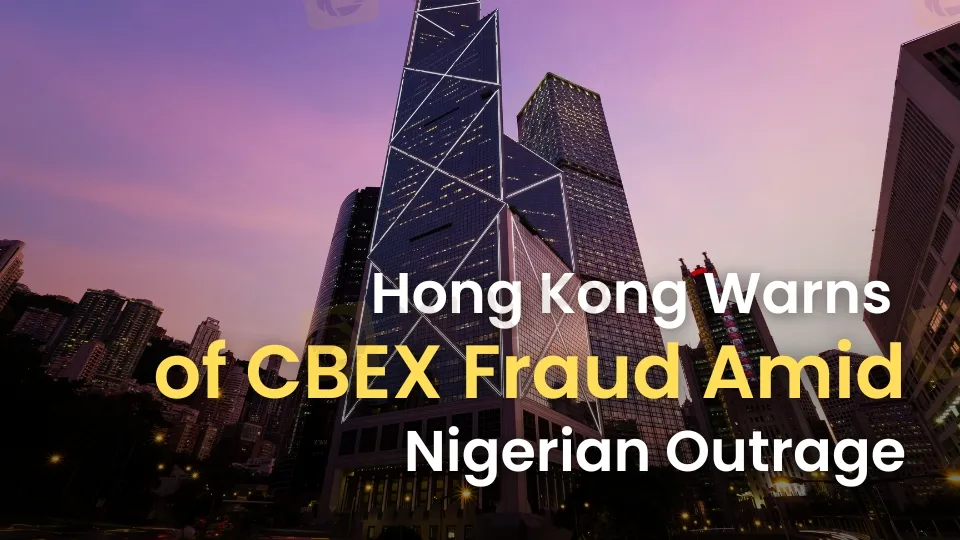简体中文
繁體中文
English
Pусский
日本語
ภาษาไทย
Tiếng Việt
Bahasa Indonesia
Español
हिन्दी
Filippiiniläinen
Français
Deutsch
Português
Türkçe
한국어
العربية
Hong Kong Warns of CBEX Group Fraud Amid Nigerian Outrage
Abstract:Hong Kong's 2024 alert revealed CBEX Group's fraudulent activities, misleading investors in Nigeria and beyond. Many face significant financial losses and withdrawal issues.

As anger spreads across Nigeria following CBEX Group's dramatic collapse, SaharaReporters has obtained explosive documents exposing the elaborate scam. A leaked Hong Kong Securities and Futures Commission (SFC) memo shows regulators had identified red flags in CBEX's operations as early as 2024 - warnings that came too late for defrauded investors.
The SFC alert exposed CBEX's fabricated claims about holding digital trading licenses in Japan and Canada. Investigations confirmed the company never received authorization to operate in either country. Established in 1989, Hong Kong's SFC maintains rigorous oversight of financial markets through its enforcement of the Securities and Futures Ordinance (SFO), which grants it substantial investigative powers.
Deceptive Tactics Uncovered
Documents reveal CBEX deliberately mimicked the name of a genuine Chinese property rights exchange, creating false credibility. While aggressively marketing itself as a licensed virtual asset platform - even displaying counterfeit license details on its website - the company lacked any legitimate regulatory approvals.

Victim testimonies paint a disturbing picture. Numerous investors reported being unable to withdraw funds, with evidence suggesting CBEX manipulated transaction records to conceal its theft. SaharaReporters' verification through Canada's business registry showed CBEX Capital Corp - the closest matching entity - had its license canceled over twelve months prior.
Nigerian Outbreak of Violence
When CBEX abruptly shut down, chaos erupted at its Ibadan office as enraged crowds ransacked the premises. Eyewitnesses described panicked investors discovering their account balances had vanished overnight. Social media platforms became flooded with heartbreaking stories of life savings obliterated by the scheme.
Nigeria's Securities and Exchange Commission (SEC) responded swiftly. Director General Emomotimi Agama issued a blunt warning: “Any unregistered platform operating in Nigeria is operating illegally.” While not naming CBEX specifically, the statement clearly referenced the scandal.
Social Media Backlash
The fallout dominated Nigerian online discourse, with @mrsean_Okwute tweeting: “When will we stop falling for these scams?” Financial analyst @Rukkie339 advised: “Any investment guaranteeing 100% returns is guaranteed to be fraudulent.”

Disclaimer:
The views in this article only represent the author's personal views, and do not constitute investment advice on this platform. This platform does not guarantee the accuracy, completeness and timeliness of the information in the article, and will not be liable for any loss caused by the use of or reliance on the information in the article.
Read more

Think Scams Won’t Happen to You? That’s Exactly What Scammers Count On
We live in a world where information is everywhere. People are more digitally literate than ever before. Financial education is just a few clicks away. And yet, investment scams are not going away but they’re getting worse. It’s tempting to think that only the gullible fall for these tricks. But that’s far from the truth. Why? Because investment scams don’t target your knowledge. They target your emotions.

RM15 Million Gone in Fake Investment Scam
A 77-year-old Malaysian retiree has suffered financial losses totalling RM15.1 million after falling victim to an elaborate share investment scam orchestrated by an individual she knew personally.

Non-Existent Online Scheme Took Away RM580,000
A Malaysian assistant human resources manager has lost nearly RM580,000 to a fraudulent online investment scheme based in Taiwan.

Beware of New Scam Tactics Lurking on WhatsApp!!
A cryptocurrency scam linked to an entity known as “Txex” or “Whalefall” is sweeping across WhatsApp, exploiting the app’s popularity to target investors with promises of extraordinary returns.
WikiFX Broker
Latest News
Five UK Financial Firms Collapse, FSCS Offers Support for Affected Clients
Why Trade Agreements Matter to Nations
Non-Existent Online Scheme Took Away RM580,000
RM15 Million Gone in Fake Investment Scam
Crypto Traders Hit by Scam Using Fake Regulatory Documents, MFSA Cautions
Trade Fights Are Heating Up—What Happens Next?
Juno Markets Upgrades to FYNXT PAMM
Think Scams Won’t Happen to You? That’s Exactly What Scammers Count On
Beware of New Scam Tactics Lurking on WhatsApp!!
Italy’s CONSOB Blocks Sites of ITradingFX and NEX TRADE in Latest Crackdown
Currency Calculator


